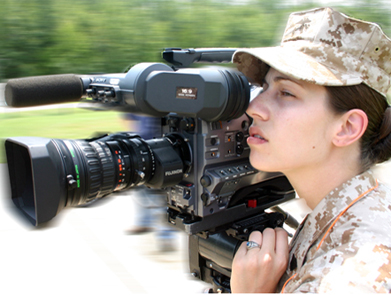Inside Higher Ed reports that the number of veterans enrolled at elite undergraduate colleges has dropped from 232 in 2011 to 168 in 2013. Wick Sloane asks why.
Tag Archives: GI Bill
Combat correspondent uses her experiences in school
By Anthony Cave, News21

Post-9/11 veteran Jennifer Brofer films a news story at the Marine Corps Logistics Base in Albany, Georgia in 2007. (Courtesy of Jennifer Brofer)
Jennifer Brofer served in the Marines, on the frontlines in Afghanistan, but she wielded a camera instead of a rifle.
Brofer, 30, a combat correspondent for more than 10 years, served in Afghanistan during 2010-11. She worked across media, using the printed word as well as video. When logistic Marines built bridges, she was there. Redeploy missions? She was there too.
“It was inherently dangerous,” Brofer, an Arlington, Texas, native, said.
Since her discharge in 2012, Brofer has used the Montgomery GI Bill to study radio-television-film at the University of Texas at Austin.
Other than a few canceled appointments for non-emergency care at the Department of Veterans Affairs outpatient clinic in Austin, her experiences have been positive, she said.
“I’m a happy gal, mentally unscathed,” Brofer said.
Still, her experience led her down the military path once again in a class she took last semester. Brofer completed a nine-minute video titled “Girls With Guns,” which chronicles the experiences of post-9/11 veteran Mary Hegar, whose helicopter was shot down in Afghanistan in 2009.
She survived and returned fire, but Hegar came home to fight again, this time the military’s ban on women in combat. She sued the U.S. Department of Defense and the Combat Exclusion Policy was eventually lifted in January 2013.
Brofer said her experiences overseas helped her share Hegar’s narrative.
“I learned how to tell a story in very adverse conditions,” she said. “I don’t take for granted what the reporters do here in America. If it wasn’t for the skill, I wouldn’t be where I am today.”
The video also highlights teenage girls in a high school Junior ROTC program. Brofer said that it is important to advocate gender equality.
Brofer wants to be a producer or director; she already has a resume start. When Christina Aguilera sang the National Anthem before the 2011 Super Bowl, the NFL Network showed a montage. Her three-second shot of a group of Marines standing in a tent made the worldwide broadcast.
Brofer, who was posted in Afghanistan at the time, had spent the night before the Super Bowl, editing film for the spot. She said that “luckily” she was behind the camera.
What We’re Reading: Week 4
By Chad Garland, News21
War is complicated. Despite its gruesome horror though, war also can be a catalyst for good. Whether that good takes the form of, well, let’s call it spiritual growth, scientific research or educational opportunity for veterans and their families, more than a decade of military conflict has reshaped American culture and our understanding of ourselves.
What We’re Reading:
War Junkie (David Axe, 6/5, Medium) From the archive of war correspondent David Axe’s blog: a tale of war and its psychological, perhaps spiritual effects. Axe offers a moving account of his 2005 trip to Baqubah, Iraq. It’s where he covered the South Carolina National Guard and the country’s first democratic elections since 1958, and where he became acquainted with war.
Looking past monuments, parades for vets’ next steps (Leo Shane III, 6/12, Stars and Stripes) Groups such as Iraq and Afghanistan Veterans of America have called for parades to welcome home war veterans. Other nonprofits have pursued the mission of putting veterans to work, volunteering or staying physically fit as a way to reintegrate and find a second calling in civilian life.
New Bill Would Give GI Bill to Surviving Spouses (Terry Howell, 5/23, Military.com) The Spouses of Heroes Education Act would give spouses of fallen service members the same full undergraduate education benefits their children receive through the Marine Gunnery Sergeant John David Fry Scholarship. The Congressional Budget Office estimates the bill could cost $200 million over the next decade.
PTSD may be prevented, researchers find (Alan Zarembo, 6/5, Los Angeles Times) Scientists have linked a particular, “relatively common,” variation of a gene to activation of a receptor in the brain that might make some more susceptible to suffering PTSD. This could provide new methods of preventing the disorder, some researchers say.
